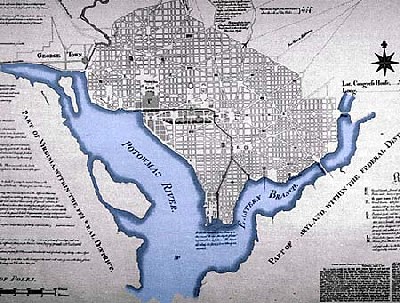") like many other planning and economic development "engagements" in the city, demonstrates both a lack of respect for citizens and civic engagement, as well as for robust planning processes generally.
Considering that DC is the original "planned city" in the U.S., the lack of respect for robust planning here is ironic.
The lack of respect for citizens isn't a surprise. I joke that it derives from how "big government [the federal govt.] trickles down and shapes little government [the local municipality] in its image."
I happened to attend yesterday's
Committee of 100 on the Federal City monthly meeting, and given that the organization is committed to robust urban planning and citizen involvement, I thought it would be appropriate to ask Mayor Gray, since he was the featured speaker, about how Executive and Legislative branch initiatives seem to be a grab bag, militantly committed to disconnectedness and showing a deep lack of respect for the importance of planning including these areas:
- gambling (Michael Brown)
- putting a professional football training facility at Res. 13 (Michael Brown, Jack Evans, Mayor Gray)
- the Walmart debacle--I don't even care at one level if Walmart comes in, just how the facilities operate, mitigation for business losses, and how they are integrated into the urban fabric of the city--where the way that elected officials (and paid lobbyists with connections to these people) jumped on board so fast and high made it almost impossible for citizens and government functionaries to push back and demand better (especially Mayor Gray, Council Chair Kwame Brown, and Harry Thomas, Jr.)
- amusements tax to fund a cinema in Ward 8 (Mayor Gray)
- various issues with the schools (Council Chair Brown)
- and libraries (the city doesn't have a master plan for libraries)
- and parks and recreation planning (the city doesn't have a master plan for parks and recreation)
- various transportation proposals (Circulator expansion, 15mph residential speed limit, extra parking time for people attending funerals, etc.), plus that the city doesn't have a master transportation plan (I know that the city is about to start a process to correct this, although I will point out I have been mentioning this lack for years...)
Elected officials believe that action is good, that planning delays things and gets in the way.
While planning is a longer process, the decisions that get made in the city, either with or without planning, last for generations.
Therefore, in the context of our own lifetimes, we usually only get one chance to get it right--at least when it involves construction--so planning matters, as does vision, and believing that the city should be and is great and shouldn't be satisfied with sloppy seconds. (See "
If the developer doesn't care, then what happens?")
SO I wrote a list of the things that would be my agenda for the city's planning function, were I in the position to lead such an agenda:
1. Committing to making the planning method and process paramount in managing and directing the activities of the city;
2. Identifying and addressing the gaps and flaws in various planning and zoning regulations that generate negative outcomes on a recurring basis;
3. Having a "master plan" for all the potential big projects in the city--McMillan Reservoir, Armed Forces Retirement Home, Walter Reed redevelopment, Poplar Point, Reservation 13, RFK Stadium grounds, St. Elizabeths campus, Parkside, freeway cap construction projects (395, SE-SW Freeway)--and integrating them, with a set of foundational principles focused on quality;
4. Developing a master transportation plan;
5. Developing a master economic development plan;
6. Developing a master plan for the libraries;
7. And a master plan for the parks and recreation system;
9. a Capital improvements budgeting program (most of the counties in the region have a six year running capital improvements program, reviewed and renewed on a running cycle every two years) [the CFO does this somewhat, but it needs to be a public function];
11. Not to mention dealing with the Zoning Code revision. I agree with some criticism that the process has been too fast and I argue it needed a different organizational framework (along the lines of the subzones outlined in the
Nashville Community Character Manual);
12. and revising the process of how the planning process is formulated so that Area Elements ("sector/district" plans) and neighborhood plans are created in a robust and complete fashion;
13. Plus, dealing with earmarks and tax abatement and incentive requests in a systematic, public, transparent fashion.
That's a start.




0 Comments:
Post a Comment
<< Home